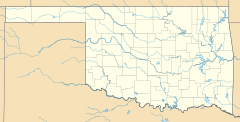Skullyville, Oklahoma facts for kids
Quick facts for kids
Skullyville, Oklahoma
|
|
|---|---|
| Country | United States |
| State | Oklahoma |
| County | Le Flore |
| Established | 1832 |
| Disestablished | 1917 |
| Elevation | 509 ft (155 m) |
| Time zone | UTC-6 (Central (CST)) |
| • Summer (DST) | UTC-5 (CDT) |
| GNIS feature ID | 1098103 |
Skullyville (also spelled Scullyville) is a small, quiet community in Le Flore County, Oklahoma, United States. It's not a big city, but a rural area. It is about one mile east of Spiro and 15 miles southwest of Fort Smith, Arkansas. Skullyville got its name from the Choctaw word iskulli or iskuli, which means money. This was because it was once the place where members of the Choctaw Nation would pick up their yearly payments.
Contents
Skullyville's Early History
Skullyville was once a very important place for the Choctaw Nation. It was even their capital city for a while! It was also the capital of the Moshulatubbee District within the Choctaw Nation. In the late 1850s, it became a stop for the famous Butterfield Stage, a stagecoach route that carried mail and passengers across the country.
This community grew into a major center for politics and business for the Choctaw Nation before the Civil War. From 1832 to 1839, Skullyville was home to the Choctaw Agency. This was where the US government's Indian agent worked with the Choctaw people.
The Choctaw Agency and Its Role
The Choctaw Indian agency was built here in 1832. This happened after the US government moved the Choctaw tribe to Indian Territory (which is now Oklahoma). The US Indian agent would give out yearly payments to the tribe members at this location. Because of this, a trading and business community grew up around the agency.
Until 1859, the community was officially called "Choctaw Agency." Major F. W. Armstrong was the first US agent here until he passed away in 1835. His brother, William Armstrong, took over after him.
Skullyville's Important Titles
The Choctaw people chose Skullyville, which was then known as "Oak Lodge," for several important roles. It became the county seat of Skullyville County. It was also the capital of the Moshulatubbee District and the main capital of the entire Choctaw Nation. Skullyville was also a stop on the California Road, a path used by many people traveling west.
Walker's Station, a stagecoach stop for the Butterfield Overland Mail route, was located in Skullyville. It's rare, but one building from its time as a county seat still stands: the Skullyville County Jail.
The Meaning Behind the Name
The name "Skullyville" comes from the Choctaw words iskulli or iskuli, which mean money. This was the place where tribal members could get their yearly payments from the Choctaw Agency. Some historians, like W. B. Morrison, suggest that "Skullyville" simply meant "Moneytown" in English.
Schools and Education
In 1834, the US Army built Fort Coffee about 3 miles north of the Choctaw Agency. The army used it for four years, then decided it was no longer needed. The buildings were then given to Methodist missionaries. They turned it into a boys' school called Fort Coffee Academy. Sadly, during the Civil War, the buildings were burned down and the school never reopened.
In the mid-1840s, the Methodist Church also started New Hope Seminary in Skullyville. This was a girls' school that attracted students from all over the Choctaw Nation. It closed during the Civil War but reopened afterward. It continued to operate until its building burned down in 1896.
Political Changes in the Choctaw Nation
By the 1840s, Skullyville had become a key center for Choctaw politics, education, and social life. However, after the Choctaw Nation moved its capital to Doaksville in 1850, there were more political disagreements among different groups within the tribe.
In 1858, most of the Choctaw members agreed to a new set of rules called the Skullyville Constitution. This new constitution got rid of the three separate districts and brought the entire nation under one main leader, who was called the governor.
Tandy Walker, who came from an important Choctaw family, took over the old Choctaw Agency building in 1858. He was put in charge of the Butterfield Stage stop there. He was also elected as the governor of the now unified Choctaw Nation. Walker used the building as his home and as the office for the Butterfield Stage. He lived there until he passed away in 1877. The old agency building was still standing in the 1930s. This building is listed on the National Register of Historic Places, which means it's an important historical site.
Skullyville's Decline and Ghost Town Status
Skullyville began to lose its importance after the Civil War. The Choctaw Nation had sided with the Confederacy during the war, and many buildings in the town, including the boys' academy, were burned during the fighting.
Later, in 1895, the Kansas City Southern Railway built its tracks in a way that bypassed Skullyville. This meant the trains didn't come through the town. Local business owners quickly moved to Spiro, which was the closest railroad station. They needed the railroad to trade their goods and get their products to market.
When the post office in Skullyville closed in 1917, it was a clear sign that the community was fading away. Today, Skullyville is considered a ghost town. There isn't much left of it, except for a cemetery.
Notable People
- Frank Crawford Armstrong: A general in the Confederate Army, who was born in Skullyville.
- Douglas H. Johnston: A governor of the Chickasaw Nation for many years (1898-1902, and 1904-1939).
- Green McCurtain: A principal chief of the Choctaw Nation (1896-1900, 1902-1910).
 | Jackie Robinson |
 | Jack Johnson |
 | Althea Gibson |
 | Arthur Ashe |
 | Muhammad Ali |



